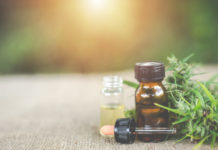
When the weather outside is frightful, the last thing we want is skin to match. Read on for tips to protect your skin from the harsh winter elements.
Cold weather, low humidity, and sun exposure all play a role in changing the look and feel of our skin. In the winter months, skin often loses its lustre, becoming dry and flaky—and sometimes even red and itchy.
Dry skin occurs when the substances between skin cells that keep them smooth and intact become damaged, resulting in water loss. Skin then tightens, dulls, becomes rough, and may even crack.
Treat dry skin
To repair our skin, it is important to choose high quality moisturizers, serums, or balms that are filled with antioxidants, as well as water-binding and anti-inflammatory ingredients.
Amino acids, fatty acids, ceramides, glycerin, and sodium PCA (pyrrolidone carboxylic acid) are key natural ingredients to look for. Use formulas with an SPF of 15 or more for daytime, as the sun can still damage skin, even in wintertime.
Reapplying a topical moisturizer is essential whenever the skin begins feeling tight. For problem areas, or where the skin is scaly, a pH-balanced exfoliant containing glycolic or salicylic acid will gently remove the excess layers and help skin cells regenerate in a natural manner, allowing the moisturizer to better penetrate the skin’s surface.
Prevent dry skin
Dry air is one of the main winter skin dehydrators. Invest in a humidifier for your bedroom, and sleep with your bedroom door closed to reap maximum moisturizing benefits.
Get plenty of rest, avoid caffeine and alcohol, and stay hydrated to keep your winter skin in top form.
Invest in a high-quality moisturizer
Moisturizers should also contain lipids and other natural moisturizing elements that are already present in the surface of the skin. Plant-based oils such as shea butter, sweet almond oil, apricot oil, jojoba oil or wax, olive oil, sesame oil, and safflower oil mimic the skin’s natural lipid content.
Choose a natural lip balm
Lips are especially vulnerable to cold weather and dry air because their cell structure is different than the rest of the face. An emollient lip balm or gloss applied frequently during the day, with a thicker application of balm at night, will help lips stay soft.
Look for quality balms that contain:
- a minimum SPF 15 protection
- beeswax
- hemp oil
- shea butter
- vitamin E
For more winter-proofing skin suggestions, visit your natural health practitioner or retailer.
Related Articles
- Rejuvenate Winter Skin
- Skin TLC





